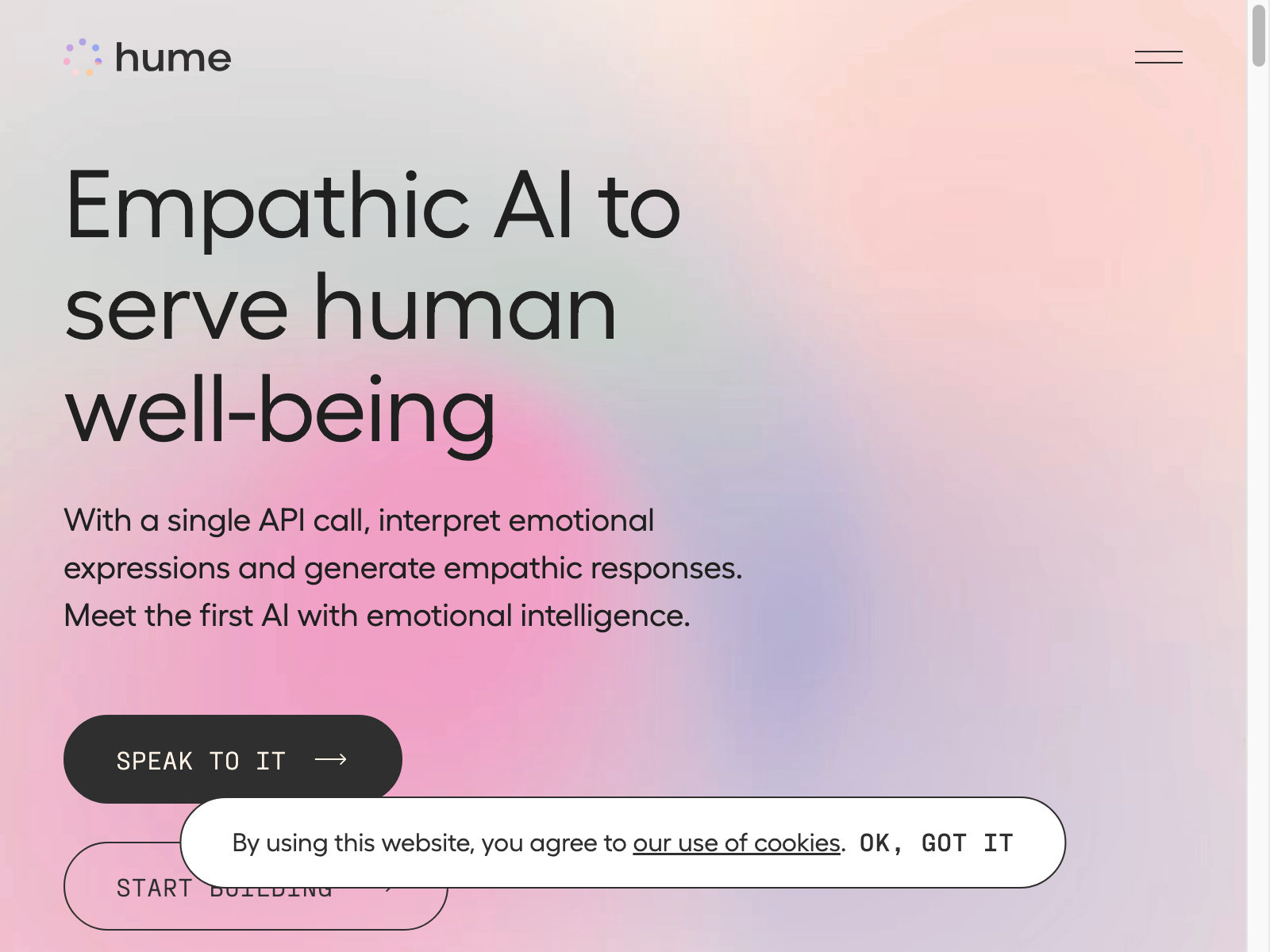Hume AI: Unlocking Emotional Intelligence

Hume AI Overview
Hume AI is a cutting-edge artificial intelligence tool that specializes in interpreting vocal and facial expressions. Built on over a decade of research, Hume AI's models instantly capture the nuances in audio, video, and image data, providing users with a deeper understanding of human emotions and nonverbal communication.
Hume AI's powerful deep learning algorithms analyze a wide range of input data, including speech, facial expressions, and body language, to deliver detailed insights into the emotional state and intent of individuals. This technology has the potential to revolutionize various industries, from customer service and market research to mental health and personal development.
Hume AI Key Features
-
Vocal Expression Analysis: Hume AI's advanced speech processing capabilities can detect and interpret the emotional tone, pitch, and cadence of a speaker's voice, providing valuable insights into their underlying feelings and attitudes.
-
Facial Expression Recognition: By analyzing micro-expressions and subtle facial cues, Hume AI can accurately identify a wide range of emotions, including joy, anger, sadness, fear, and surprise, among others.
-
Multimodal Integration: Hume AI seamlessly combines vocal and facial expression analysis, allowing for a more comprehensive understanding of an individual's emotional state and nonverbal communication.
-
Real-Time Processing: Hume AI's models are designed for fast and efficient processing, enabling real-time analysis of input data and immediate feedback to users.
-
Customizable Models: Hume AI offers the ability to fine-tune its models to specific use cases, allowing organizations to tailor the tool to their unique needs and preferences.
Hume AI Use Cases
Hume AI's versatile technology has a wide range of applications across various industries:
- Customer Service: Hume AI can be integrated into call centers and customer service interactions to help agents better understand customer emotions and tailor their responses accordingly.
- Market Research: Hume AI can be used to analyze consumer reactions and feedback during focus groups, interviews, and product demos, providing valuable insights for product development and marketing strategies.
- Mental Health: Hume AI's emotional analysis capabilities can be leveraged in mental health assessments, therapy sessions, and remote monitoring to help identify and address emotional well-being concerns.
- Personal Development: Individuals can use Hume AI to gain a deeper understanding of their own emotional responses and nonverbal communication patterns, enabling them to improve their self-awareness and interpersonal skills.
Hume AI Pros and Cons
Pros:
- Highly accurate and nuanced emotional analysis capabilities
- Seamless integration of vocal and facial expression recognition
- Customizable models to suit specific use cases
- Real-time processing for immediate insights
- Potential to revolutionize various industries
Cons:
- Reliance on high-quality input data for optimal performance
- Potential privacy concerns regarding the analysis of personal data
- Ongoing maintenance and training required to keep models up-to-date
- Potential ethical implications of using AI for emotional analysis
Hume AI Pricing
Hume AI offers flexible pricing options to cater to different business needs. The following table outlines the available plans:
| Plan | Price |
|---|---|
| Starter | $99/month |
| Business | $499/month |
| Enterprise | Custom Pricing |
The Starter plan is suitable for small businesses and individual users, while the Business and Enterprise plans are designed for larger organizations with more advanced requirements. All plans include access to Hume AI's core features, with the higher-tier plans offering additional capabilities and customization options.
Hume AI Alternatives
While Hume AI is a standout player in the field of emotional intelligence AI, there are a few alternative solutions worth considering:
- Affectiva: Affectiva is another renowned provider of emotional analysis technologies, offering a range of products for various use cases, including automotive, market research, and mental health.
- Microsoft Cognitive Services: Microsoft's Cognitive Services suite includes emotion recognition capabilities that can be integrated into custom applications and workflows.
- IBM Watson Studio: IBM Watson Studio's emotion analysis features can be leveraged for a wide range of applications, from customer experience to human resources.
Each of these alternatives has its own strengths and weaknesses, and the choice will often depend on the specific needs and requirements of the user or organization.
Hume AI FAQ
-
What data sources does Hume AI support? Answer: Hume AI can analyze a wide range of input data, including audio recordings, video files, and images. The platform supports various file formats and can process both real-time and pre-recorded data.
-
How accurate is Hume AI's emotional analysis? Answer: Hume AI's deep learning models have been trained on extensive datasets and have demonstrated high accuracy in emotion recognition, often exceeding 90% in independent studies.
-
Can Hume AI be integrated with other software platforms? Answer: Yes, Hume AI offers a range of integration options, including APIs and SDKs, allowing users to seamlessly incorporate the platform's emotional analysis capabilities into their existing workflows and applications.
-
What privacy and security measures are in place for Hume AI? Answer: Hume AI takes privacy and security very seriously, employing industry-standard encryption, access controls, and data protection measures to ensure the confidentiality and integrity of user data. The platform also provides transparency around data usage and processing.